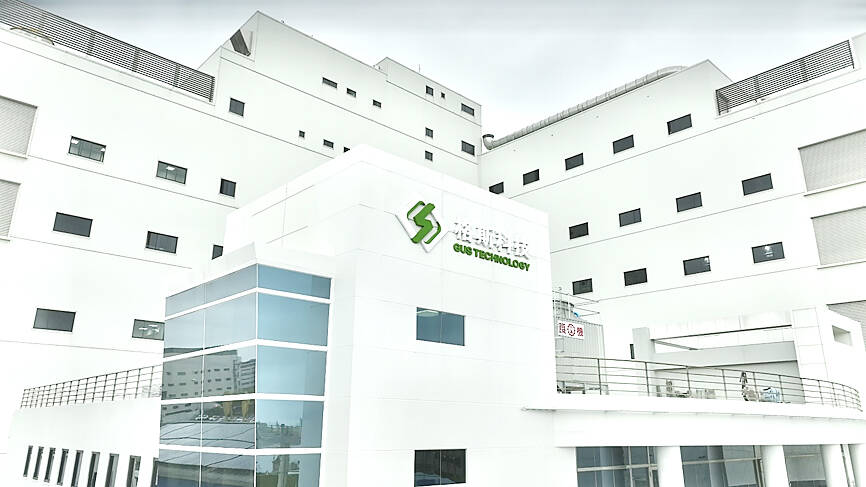Gus Technology Co (格斯科技), a lithium-titanate-oxide (LTO) battery cell and pack maker, on Wednesday launched its first large-scale battery factory and said it is in discussing with potential customers to quadruple its battery capacity to meet fast-growing demand.
The NT$4 billion (US$130.3 million) fab, in Taoyuan City’s Jhongli District (中壢), is to start operations in the third quarter, with an initial capacity of 250 megawatts per year.
The schedule is ahead of Gus Technology’s local competitors, including Taiwan Cement Corp (台泥), Formosa Group (台塑集團) subsidiary Formosa Smart Energy Tech Corp (台塑新智能科技) and Hon Hai Precision Industry Co (鴻海精密).

Photo courtesy of Gus Technology Co
The fab is expected to reach full capacity of 1 gigawatt per year by the second quarter of next year, the company said.
The company counts Japan’s Kaneka Corp, Toshiba Corp and InnoBat Auto of Slovakia, the European pioneering supplier of premium batteries for electric vehicles, as its major customers.
Once the fab is 100 percent utilized, it would produce 6 million high-end LTO battery packs per year, which would translate into an annual revenue of NT$6 billion to NT$9 billion, Gus chairman Chang Chung-chieh (張忠傑) said during the launch ceremony on Wednesday.
The company plans to produce battery cells used in high-end automated guided vehicles and home battery storage systems at the fab in the initial stage, Chang said. Next year, it will start shipping battery cells used in electric vehicles, given a longer qualification process with carmakers, he said. The company is also expanding its business scope to battery cells used in unmanned aircrafts, he said.
Gus also focuses on developing battery materials used in next-generation NCM batteries, which compose of lithium, nickel, cobalt and manganese.
Gus, an eight-year-old company based in New Taipei City’s Sijhih District (汐止), said new capacity expansions are being planned, as customers’ demand for its LTO battery packs would surge to more than 4 gigawatts within next three years, Chang told reporters.
Chang said the uptake of LTO battery soft packs are increasing, especially for cars, as such soft-pack batteries are 15 percent lighter than the traditionally hard square and cylindrical battery packs and can be used under extreme temperatures from minus Celsius 40 degrees to 60 degrees. Besides, its LTO soft-pack batteries made by Gus can be recharged and discharged 10,000 times.
Gus on Wednesday signed a memorandum of understanding (MOU) with its customer Midwest Energy Pvt of India to build a LTO battery pack in India, with most funding from the Indian company.
Other factories could be built with potential customers abroad, the company said.
The company also signed two MOUs with Echion Technologies of the UK and Beyonder of Norway to make LTO batteries on a contract basis.
Gus would also cooperate with its international partners in aspects such as battery cell anode materials, energy storage equipment and raw materials, it said.
LTO batteries charge faster than conventional lithium-ion batteries and are safer.

TAKING STOCK: A Taiwanese cookware firm in Vietnam urged customers to assess inventory or place orders early so shipments can reach the US while tariffs are paused Taiwanese businesses in Vietnam are exploring alternatives after the White House imposed a 46 percent import duty on Vietnamese goods, following US President Donald Trump’s announcement of “reciprocal” tariffs on the US’ trading partners. Lo Shih-liang (羅世良), chairman of Brico Industry Co (裕茂工業), a Taiwanese company that manufactures cast iron cookware and stove components in Vietnam, said that more than 40 percent of his business was tied to the US market, describing the constant US policy shifts as an emotional roller coaster. “I work during the day and stay up all night watching the news. I’ve been following US news until 3am

UNCERTAINTY: Innolux activated a stringent supply chain management mechanism, as it did during the COVID-19 pandemic, to ensure optimal inventory levels for customers Flat-panel display makers AUO Corp (友達) and Innolux Corp (群創) yesterday said that about 12 to 20 percent of their display business is at risk of potential US tariffs and that they would relocate production or shipment destinations to mitigate the levies’ effects. US tariffs would have a direct impact of US$200 million on AUO’s revenue, company chairman Paul Peng (彭雙浪) told reporters on the sidelines of the Touch Taiwan trade show in Taipei yesterday. That would make up about 12 percent of the company’s overall revenue. To cope with the tariff uncertainty, AUO plans to allocate its production to manufacturing facilities in

Six years ago, LVMH’s billionaire CEO Bernard Arnault and US President Donald Trump cut the blue ribbon on a factory in rural Texas that would make designer handbags for Louis Vuitton, one of the world’s best-known luxury brands. However, since the high-profile opening, the factory has faced a host of problems limiting production, 11 former Louis Vuitton employees said. The site has consistently ranked among the worst-performing for Louis Vuitton globally, “significantly” underperforming other facilities, said three former Louis Vuitton workers and a senior industry source, who cited internal rankings shared with staff. The plant’s problems — which have not

COLLABORATION: Given Taiwan’s key position in global supply chains, the US firm is discussing strategies with local partners and clients to deal with global uncertainties Advanced Micro Devices Inc (AMD) yesterday said it is meeting with local ecosystem partners, including Taiwan Semiconductor Manufacturing Co (TSMC, 台積電), to discuss strategies, including long-term manufacturing, to navigate uncertainties such as US tariffs, as Taiwan occupies an important position in global supply chains. AMD chief executive officer Lisa Su (蘇姿丰) told reporters that Taiwan is an important part of the chip designer’s ecosystem and she is discussing with partners and customers in Taiwan to forge strong collaborations on different areas during this critical period. AMD has just become the first artificial-intelligence (AI) server chip customer of TSMC to utilize its advanced